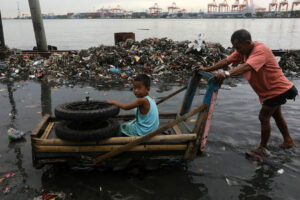




Philippines Trade Update: Imports weaken on tepid demand
 DOWNLOAD
DOWNLOAD

Policy Rate Updates: BSP outlook — cloudy with a chance of rate cut
 DOWNLOAD
DOWNLOAD

January Economic Update: Growth slows, prices rise
 DOWNLOAD
DOWNLOAD


‘Wealth tax’ can fund efforts to combat poverty, climate change — US economist Sachs

Countries must consider imposing a wealth tax on the “super-rich” to generate much-needed funds to address issues like poverty and climate change, according to American economist Jeffrey D. Sachs.
“We need a wealth tax. It should be a global tax that is paid directly to global public goods so that we can fund the fight against climate change, extreme poverty and so forth,” Mr. Sachs, president and co-founder of the United Nations Sustainable Development Solutions Network, told a forum at the Ateneo de Manila University on Oct. 17.
According to the Forbes World’s Billionaires list released last April, there are 2,781 billionaires around the globe in 2024. Forbes said the world’s billionaires are collectively worth a record USD 14.2 trillion, USD 2 trillion more than last year.
The Forbes World’s Billionaires list included 16 from the Philippines, led by real estate tycoon Manuel B. Villar, Jr. (USD 11 billion) and ports mogul Enrique K. Razon, Jr. (USD 7.3 billion).
“Taxing the wealthy is not only part of justice, it’s very practical,” added Mr. Sachs, who is also a professor and director of the Center for Sustainable Development at Columbia University.
“And these ultra-wealthy would never even notice, frankly. They have more money than they could spend in many lifetimes… So, we’re making a mistake of not directing our public resources in the right way.”
However, taxing the super-rich will be challenging, Mr. Sachs said, noting that many political systems globally are dominated by billionaires.
In the Philippines, calls for the imposition of a wealth tax have been rejected by the government, despite rising debt and a ballooning budget deficit.
Finance Secretary Ralph G. Recto earlier brushed off proposals for a wealth tax, saying the government already implements enough revenue-generating measures.
Countries that already impose a wealth tax include Norway, Ivory Coast, Spain, Argentina, Colombia, Norway, Uruguay, Switzerland, France, Italy, the Netherlands, Belgium, Portugal, and Bangladesh.
Consumer group Samahan at Ugnayan ng mga Konsyumer para sa Ikauunlad ng Bayan (SUKI) Network previously noted that countries like Norway and the Ivory Coast have raised revenues from wealth taxes to boost infrastructure and public services.
“A wealth tax should not have to accelerate price increases… unless the super-rich recommend hikes in the prices of services and products under their purview to recover diminished individual wealth,” a representative from SUKI Network said in a Facebook Messenger chat.
In 2022, lawmakers from the Makabayan bloc filed House Bill (HB) No. 258, proposing to slap a 1-3% tax on the “super-rich” or individuals with a net value of taxable assets exceeding PHP 1 billion. The measure expects to generate around PHP 236.7 billion yearly from the top 50 richest Filipinos alone.
LUXURY TAXES
Meanwhile, House Ways and Means Committee Chairman and Albay Rep. Jose Ma. Clemente S. Salceda said he is still studying a separate proposal to increase the current rate of “luxury” taxes.
Under Section 150 of the National Internal Revenue Code, a 20% luxury tax is imposed on goods and services deemed “nonessential,” such as jewelry, perfume, precious metals, and yachts and other vessels intended for pleasure and sports, among others.
HB 6993, filed last year, seeks to hike the tax on nonessentials to 25%. It expects to raise around PHP 15.5 billion every year.
The bill also proposes expand the list of excisable articles to include wristwatches, bags, wallets and belts valued at more than PHP 50,000; the sale of residential properties higher than PHP 100,000 per square meter; beverages that cost above PHP 20,000 per liter; and paintings with an estimated value of over PHP 1 million sold by individuals other than the artist.
It also seeks to impose the luxury tax on include antiques valued at PHP 100,000; automobiles, whether brand new or second-hand, with a value of PHP 10 million; and private aircraft and parts except those used by the Philippine government or by airlines and logistics companies.
“My proposal taxes nonessential, even conspicuous, consumption. Obviously, it would also reduce our deficit by as much as 0.2% of GDP (gross domestic product),” Mr. Salceda said in a Viber message.
Mr. Salceda also said he is looking for the best way to implement the measure, citing its effects on consumer behavior.
“What we don’t want is people purchasing those items abroad instead to avoid our taxes,” he said.
“Also, we don’t want to discourage foreign tourists from coming to the country, but we are still working out a system with the BIR (Bureau of Internal Revenue) to see if the excise tax component can also be refunded to foreign tourists.” – Beatriz Marie D. Cruz, Reporter
This article originally appeared on bworldonline.com





 By BusinessWorld
By BusinessWorld